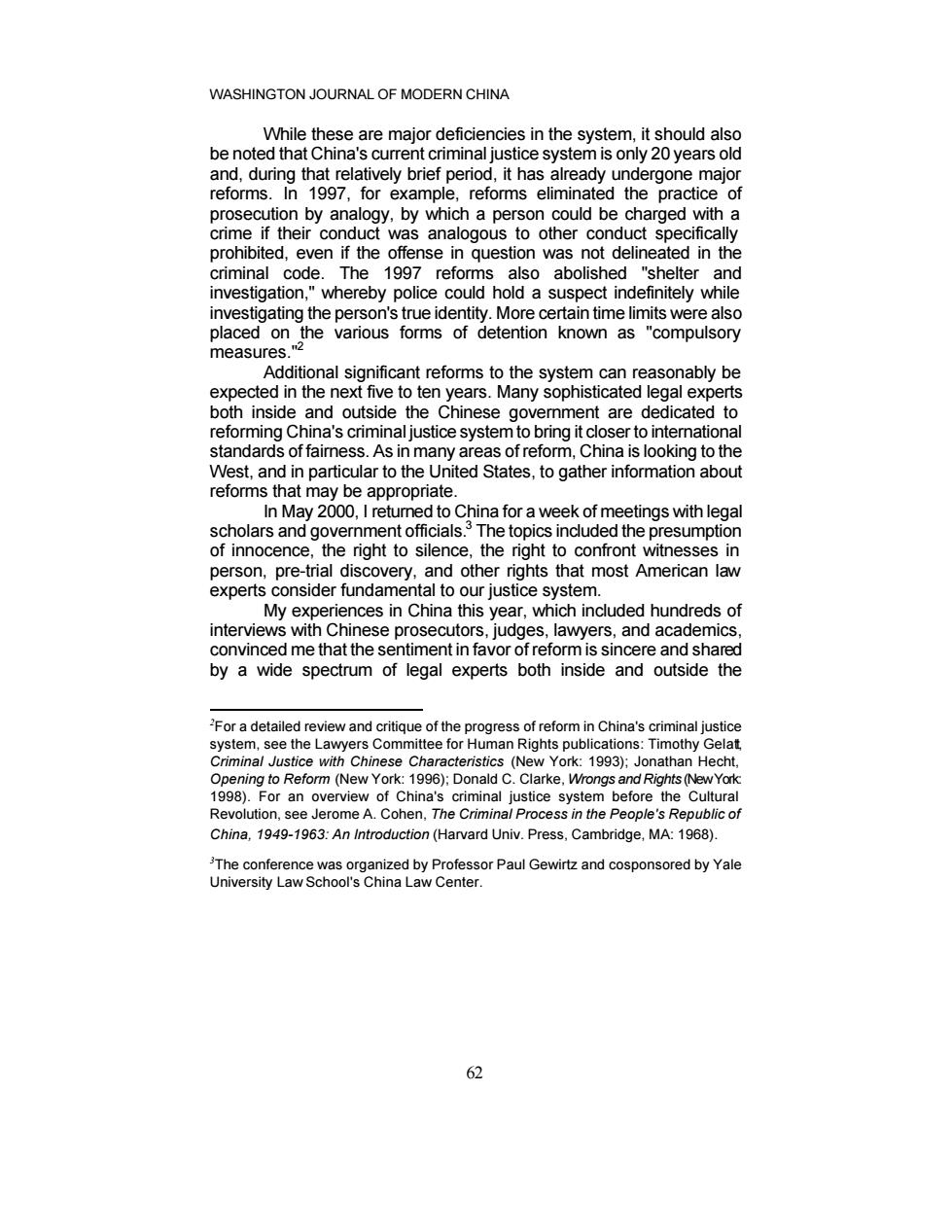正在加载图片...

WASHINGTON JOURNAL OF MODERN CHINA While these are major deficiencies in the system,it should also be noted that China's current criminal justice system is only 20 years old and,during that relatively brief period,it has already undergone major reforms.In 1997,for example,reforms eliminated the practice of prosecution by analogy,by which a person could be charged with a crime if their conduct was analogous to other conduct specifically prohibited,even if the offense in question was not delineated in the criminal code.The 1997 reforms also abolished "shelter and investigation,"whereby police could hold a suspect indefinitely while investigating the person's true identity.More certain time limits were also placed on the various forms of detention known as "compulsory measures."2 Additional significant reforms to the system can reasonably be expected in the next five to ten years.Many sophisticated legal experts both inside and outside the Chinese government are dedicated to reforming China's criminal justice system to bring it closer to international standards of fairness.As in many areas of reform,China is looking to the West,and in particular to the United States,to gather information about reforms that may be appropriate. In May 2000,I retumed to China for a week of meetings with legal scholars and government officials.The topics included the presumption of innocence,the right to silence,the right to confront witnesses in person,pre-trial discovery,and other rights that most American law experts consider fundamental to our justice system. My experiences in China this year,which included hundreds of interviews with Chinese prosecutors,judges,lawyers,and academics, convinced me that the sentiment in favor of reform is sincere and shared by a wide spectrum of legal experts both inside and outside the PFor a detailed review and critique of the progress of reform in China's criminal justice system,see the Lawyers Committee for Human Rights publications:Timothy Gelat Criminal Justice with Chinese Characteristics (New York:1993);Jonathan Hecht. Opening to Reform (New York:1996):Donald C.Clarke,Wrongs and Rights(New York 1998).For an overview of China's criminal justice system before the Cultural Revolution,see Jerome A.Cohen,The Criminal Process in the People's Republic of China,1949-1963:An Introduction(Harvard Univ.Press,Cambridge,MA:1968). 3The conference was organized by Professor Paul Gewirtz and cosponsored by Yale University Law School's China Law Center. 62WASHINGTON JOURNAL OF MODERN CHINA 62 While these are major deficiencies in the system, it should also be noted that China's current criminal justice system is only 20 years old and, during that relatively brief period, it has already undergone major reforms. In 1997, for example, reforms eliminated the practice of prosecution by analogy, by which a person could be charged with a crime if their conduct was analogous to other conduct specifically prohibited, even if the offense in question was not delineated in the criminal code. The 1997 reforms also abolished "shelter and investigation," whereby police could hold a suspect indefinitely while investigating the person's true identity. More certain time limits were also placed on the various forms of detention known as "compulsory measures."2 Additional significant reforms to the system can reasonably be expected in the next five to ten years. Many sophisticated legal experts both inside and outside the Chinese government are dedicated to reforming China's criminal justice system to bring it closer to international standards of fairness. As in many areas of reform, China is looking to the West, and in particular to the United States, to gather information about reforms that may be appropriate. In May 2000, I returned to China for a week of meetings with legal scholars and government officials.3 The topics included the presumption of innocence, the right to silence, the right to confront witnesses in person, pre-trial discovery, and other rights that most American law experts consider fundamental to our justice system. My experiences in China this year, which included hundreds of interviews with Chinese prosecutors, judges, lawyers, and academics, convinced me that the sentiment in favor of reform is sincere and shared by a wide spectrum of legal experts both inside and outside the 2For a detailed review and critique of the progress of reform in China's criminal justice system, see the Lawyers Committee for Human Rights publications: Timothy Gelatt, Criminal Justice with Chinese Characteristics (New York: 1993); Jonathan Hecht, Opening to Reform (New York: 1996); Donald C. Clarke, Wrongs and Rights (New York: 1998). For an overview of China's criminal justice system before the Cultural Revolution, see Jerome A. Cohen, The Criminal Process in the People's Republic of China, 1949-1963: An Introduction (Harvard Univ. Press, Cambridge, MA: 1968). 3The conference was organized by Professor Paul Gewirtz and cosponsored by Yale University Law School's China Law Center